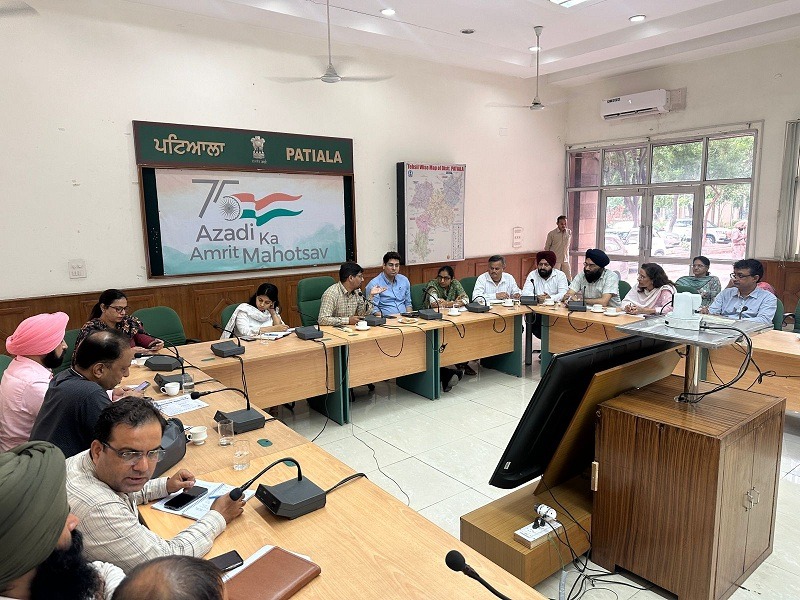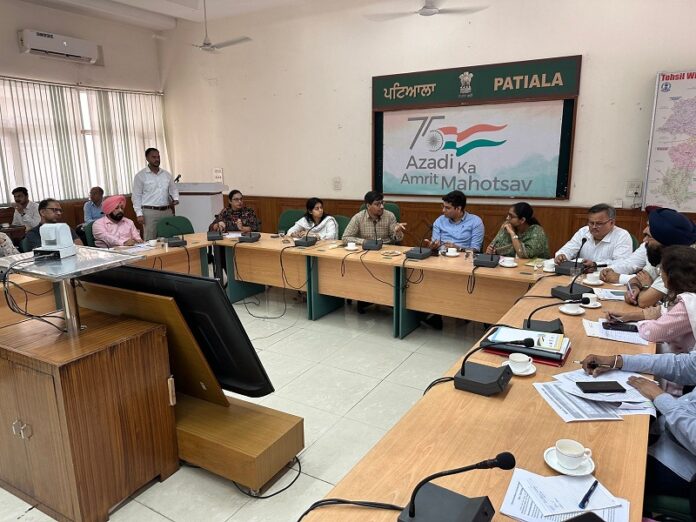DC Patiala assign duties to various departments to address water borne disease issue
Kanwar Inder Singh/ royalpatiala.in News/ July 22,2024
Deputy Commissioner Patiala, Showkat Ahmad Parray, chaired a crucial meeting of the District Surveillance Committee to tackle the issue of water-borne diseases in the district. The meeting was attended by Municipal Commissioner Aditya Dachalwal, ADCs Kanchan and Navreet Kaur Sekhon, Civil Surgeon Dr. Sanjay Goel, and other officials from various departments.
The focus of the meeting remained on addressing common water-borne diseases such as Cholera, ADD/Gastroenteritis, Hepatitis A and E, and Typhoid.
In the past five years, Patiala district has experienced 12 water-borne disease outbreaks in various areas. Vulnerable areas identified by the district administration includes Sanjay Colony, Jejji Colony, Indira Colony, Markel Colony, Shigligar Basti, Abchal Nagar, Bharat Nagar Near DCW, Bharat Nagar Nabha Road, Tafazalpura, Badungar, Old Bishan Nagar, Deen Dyaal Upadhay Nagar, Muslim Colony, Mathura Colony, Heera Bagh, Bindra Colony, New Yadwindra Colony, Babu Singh Colony in Patiala Urban; Ablowal, Alipur Arayian, Choura in Patiala Rural; Waraichan Patti, Malkana Patti, Gharama Patti, Tibbi Mohalla, Bhamana Patti, Sarai Patti, Lohara Mohalla in Samana; Old Rajpura, Rajpura Town in Rajpura; Bazigar Basti, Mehas Gate, Valmeek Basti in Nabha; Pabri, Saidkheri, Madanpur, Nalaas in Block Kalomajra; Deha Colony, Ward No. 10, Ward No. 11 in Ghanour; and Ward No. 11, Khalsa Colony, Bhankhar Colony in Sanour.
During the meeting, it was emphasized that the Municipal Corporation Patiala should ensure regular surveys of water lines in slum and vulnerable areas to check for leakage, and perform drinking water sampling in all areas. In case of dirty water supply, mixing, or foul smell, an alternative chlorinated water source should be provided through tankers, and super-chlorination (2-4 mg/l residual chlorine) should be implemented during outbreaks.
Timely procurement of insecticides and larvicides was highlighted, along with the creation of an advanced fogging schedule, especially in areas reporting dengue cases. Fogging coverage should be ensured twice monthly in all streets from August to November, and the Health Branch of MCP should actively respond in outbreak situations.
The Patiala Development Authority was instructed to prepare a plan for anti-larval measures and fogging, and to ensure the provision of clean and safe drinking water in their areas. The Water Supply and Sanitation/Water Supply & Sewage Board were also tasked with conducting regular surveys of water lines in slum and vulnerable areas, performing drinking water sampling, providing alternative chlorinated water sources if needed, and implementing super-chlorination during outbreaks.

The Government Medical College, Patiala was directed to prepare for water and vector-borne diseases with necessary medicines and supplies, ensure daily reporting of all diseases on the IHIP portal with complete case details, monitor the status of Dengue wards, and appoint a nodal officer to monitor case clustering and alert the District Health Department. The Indian Medical Association, Patiala was advised to ensure confirmatory testing for dengue and malaria through Elisa IgM, NS1, and microscopy, and to report clustering of notifiable diseases like Diarrhea, Jaundice, Cholera, Dengue, and Malaria to prevent outbreaks.
Incharge, DPHL, Mata Kaushlya Hospital was asked to ensure availability of logistics for outbreak investigations, train staff and ensure their availability during outbreaks, and establish a proper reporting mechanism. The Education Department was instructed to conduct regular IEC activities for disease prevention, appoint a nodal teacher for this purpose, encourage hand washing among students, supervise mid-day meals in schools, report any increase in unusual cases in schools to the nearest health facility, observe every Friday as Dry-Day in schools, and submit proposals for additional grades or incentives for students participating in dengue control activities.
The CDPO was directed to ensure Anganwadi Workers report any rise in disease cases, provide safe drinking water in all Anganwadi centers, supervise mid-day meals, and use chlorine tablets during outbreaks. The Department of Rural Development and Zila Parishad was asked to ensure Rural Medical Officers report notifiable diseases, conduct regular malaria slide tests, and maintain village sanitation to prevent disease outbreaks. The Department of Police was tasked with preventing Aedes mosquito breeding in impounded vehicles, conducting weekly cleanliness drives in police stations, and providing a contact number for health staff protection during surveys.
The Department of Forest and Animal Husbandry was instructed to monitor piggeries for Japanese Encephalitis spread, ensure vaccination of domestic and wild animals, raise awareness about zoonotic diseases among relevant stakeholders, and regulate shops selling animals/birds near old bus stands. The District Program Officer, NTEP was asked to report acute respiratory and severe acute respiratory infection cases with proper categorization and testing. The District Program Officer, HIV was tasked with screening high-risk groups for hepatitis B/C and ensuring proper data entry to reduce lost follow-up cases.
The District Program Officer, RCH was instructed to screen all pregnant females for hepatitis B, hepatitis C, and HIV, ensure institutional delivery and proper care for positive cases, and ensure children born to mothers who are hepatitis B positive are administered HBIG within 12 hours of birth. The NGOs were requested to conduct IEC activities for public awareness to communicate preventive measures.










